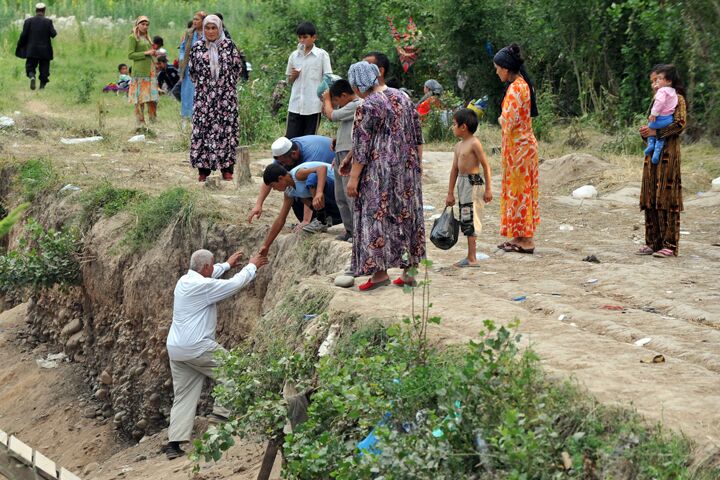
Kyrgyzstan Pleas for Russian Intervention to Quell Unrest
Moscow sent soldiers into Kyrgyzstan on Sunday to boost security at the Russian military base near Bishkek as ethnic clashes blaze through the south of the country and thousands attempt to escape into neighboring Uzbekistan. Tashkent is concerned that if Moscow steps in militarily, it will use the crisis as a springboard to reclaim former Soviet Union ground, eventually including Uzbekistan. But the real concern should be coming from Washington.
Since the revolution that overthrew the Kyrgyz government in April, instability has fomented small-scale riots throughout the former Soviet colony. But in the last week, the unrest has escalated from internal Kyrgyz strife to a regional crisis roping in the nation’s more powerful neighbor Uzbekistan and the regional giant, Russia. The Red Cross reported on Monday that the situation was “getting worse by the hour.”
Analysts say that Tashkent’s support of Kyrgyzstan’s interim government has prodded ethnic Kyrgyz to attack ethnic Uzbeks living in Kyrgyzstan, of which there are hundreds of thousands. But tensions between the Kyrgyz and Uzbek populations have existed for decades, and had no apparent reason for exploding into violence this week. Evidence suggests that the conflict was provoked by external forces, and that the roots of the conflict were not shaped by ethnicity but by politics.
Mercenary snipers were reportedly sent into the southern regions of Osh and Jalalabad to unleash chaos by firing indiscriminately at both Kyrgyz and Uzbeks. The Kyrgyz government claims the clashes are a design of the recently ousted President Kurmanbek Bakiyev in an effort to destabilize the country. Bakiyev, who has been in exile in Belarus since the April coup, denies any involvement in the violence. Whether Bakiyev is involved or not, it would not be anomalous to history to discover that the Kremlin is the hidden original source of the instability.
On Saturday, Tashkent opened its borders to take in Uzbek refugees fleeing the turmoil. Border guards had allowed non-Uzbeks to cross into Uzbekistan for a price, but on Monday Uzbek officials closed the border claiming Uzbekistan could not accommodate more refugees. As of Tuesday morning, some 100,000 Uzbeks were amassed at the border.
So far, Russia has ignored requests by Kyrgyzstan’s interim government to fly forces and Osh where as many as 170 people have been killed and 1,500 wounded in the last week. But the Kremlin announced on Monday that officials in Moscow are debating the possibility of military intervention to quell the unrest. The general Kyrgyz population sees Russia as the only power that could bring stability to the teetering nation.
For the Russian-led Collective Security Treaty Organization (csto), the situation could emerge as a test case. The csto, made up of Russia, Armenia, Belarus, Kazakhstan, Kyrgyzstan, Uzbekistan and Tajikistan, is described as Moscow’s response to nato expansion, but it has not been active since its founding in 2002. Some analysts say the Kyrgyz conflict is a situation demanding csto involvement.
“If the csto cannot act in this situation, there will be serious questions about its long-run purpose,” said Svante Cornell, a research director at the Stockholm’s Central Asia-Caucasus Institute.
But Moscow has insisted that no csto forces be deployed in Kyrgyzstan on grounds that the organization is not to interfere in its members’ internal affairs. And the Kyrgyz provisional government has not requested csto troops, but strictly Russian forces.
Tashkent has indicated that it will perceive the deployment of Russian troops as a forerunner to military action against Uzbekistan, a war Moscow is not currently eager to pursue. What Moscow is eager for is to remove America’s presence in the region.
A Shift in the Balance of Power
On Sunday, a former U.S. official specializing in U.S.-Kyrgyz relations told theWashington Times: “The balance of power in Central Asia is about to shift further against U.S. interests.”
The shift is underway.
In the midst of the violence, Russia is pressuring Kyrgyzstan’s interim government to close the strategic U.S. airbase in Manas, which is America’s only remaining military base in Central Asia. With 50,000 American troops passing through Manas on their way to and from Afghanistan, the base is vital to Washington, but Moscow hates the U.S. presence in its backyard. A $2 billion donation from Moscow prompted Bishkek to threaten to shut the base down last year, but after Washington tripled its rent, Kyrgyzstan agreed to leave it open.
On June 8, Russian Prime Minister Vladimir Putin broached the issue again, saying Bishkek was free to decide whether the base should remain open or not.
On Tuesday, Kyrgyzstan’s interim Foreign Minister Ruslan Kazakpaev emphasized that the Manas agreement was concluded by Bakiyev’s ousted government, and said Bishkek would review it after the October elections. “The Russian Federation was and remains the main strategic partner for Kyrgyzstan,” Kazakpaev said.
Speculation is rife that Moscow is waiting for a commitment by Kyrgyzstan to shut Manas down before it agrees to intervene and bring an end to the ethnic violence.
America’s influence in Central Asia, like its desire to spread democracy throughout the world, has cooled. But Russia is anxious to see Washington completely removed from the region.
In 2005, the Trumpet wrote: “The eviction of America from Central Asia will constitute a severe geopolitical defeat for the U.S. and significant win for Russia and China. … We can expect Russia and China to succeed in evicting America from Central Asia.”
Moscow will likely exploit Kyrgyzstan’s crisis to obtain a promise by Bishkek to shut Manas down. Whether blatantly or subtly, Russia will use its growing leverage to steer the situation to accelerate the demise of U.S. influence, and to further tip the scales of power toward Moscow.
